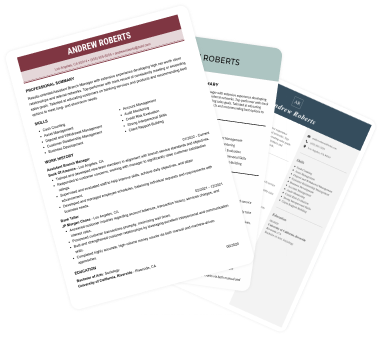
How to Write a Letter of Application That Works
Make your job application letter shine! Follow our letter of application template and examples for a polished, professional submission.
February 18, 2026
Last updated on 9 December, 2025
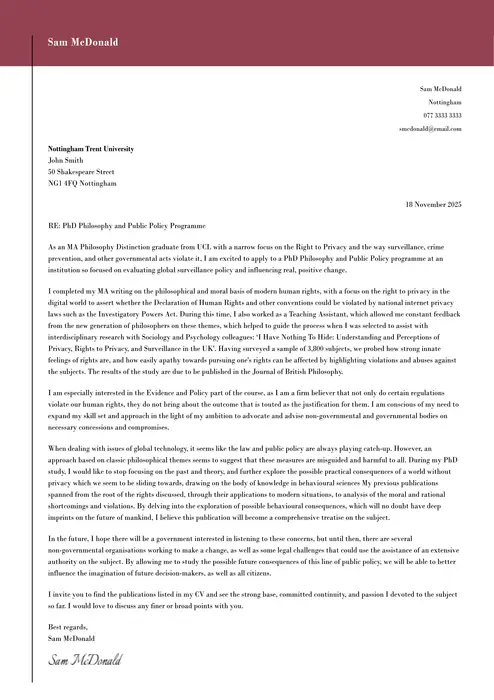
Our customers have been hired by*:
It’s not important whether you are trying to keep your student discounts long into your 30s or answer some questions nobody could in the history of humanity. It can all be achieved with a properly crafted PhD application.
The places are very limited, and there are dozens of good candidates. But don’t worry. With this guide about PhD cover letter, you’ll write one that makes a difference. In this article, you'll get step-by-step instructions on writing a PhD application and a PhD cover letter example for the right reference. On top of that, you'll find expert tips and examples to craft a winning cover letter for PhD.
Use the LiveCareer cover letter builder and your cover letter will write itself. Choose a professional template, answer a few easy questions and the creator will generate a professional cover letter for you with just one click.
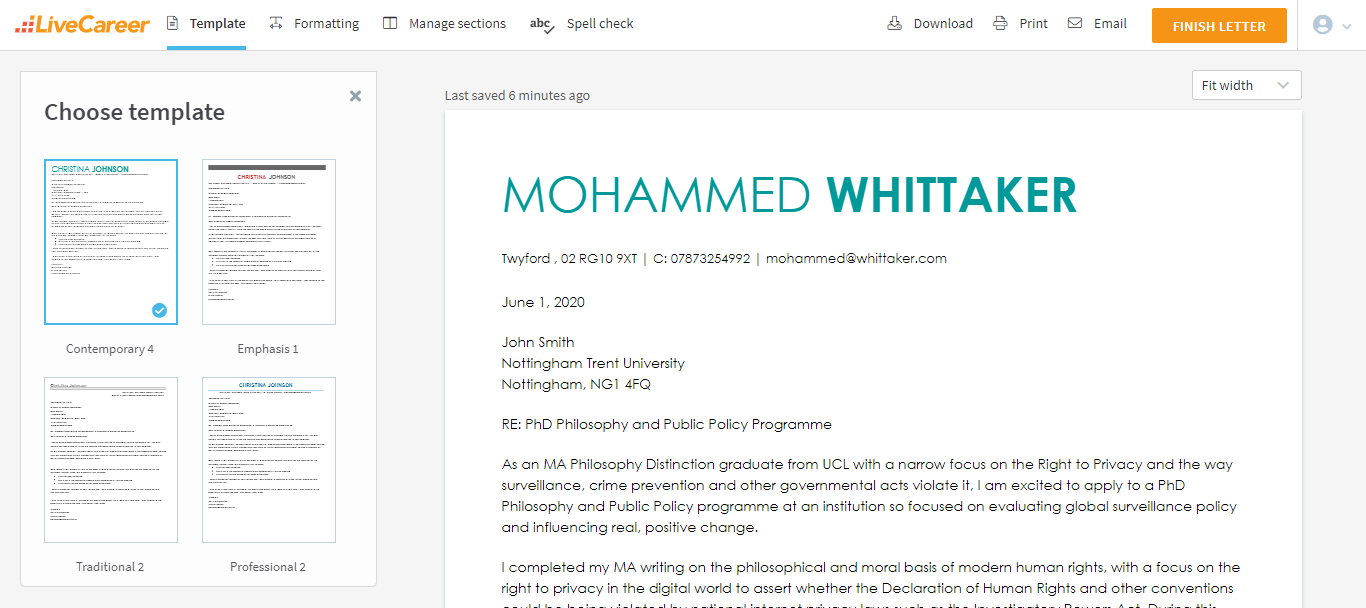
Need a different cover letter? Check these samples:
Haven't found what you're looking for? Check all our cover letter examples.
Mohammed Whittaker
97 Castledore Road
Twyford
RG10 9XT
07873254992
mohammed@whittaker.com
June 1, 2021
John Smith
Dean of Philosophy
Nottingham Trent University
50 Shakespeare Street
Nottingham
NG1 4FQ
RE: PhD Philosophy and Public Policy Programme
As an MA Philosophy Distinction graduate from UCL with a narrow focus on the Right to Privacy and the way surveillance, crime prevention, and other governmental acts violate it, I am excited to apply to a PhD Philosophy and Public Policy programme at an institution so focused on evaluating global surveillance policy and influencing real, positive change.
I completed my MA writing on the philosophical and moral basis of modern human rights, with a focus on the right to privacy in the digital world to assert whether the Declaration of Human Rights and other conventions could be violated by national internet privacy laws such as the Investigatory Powers Act. During this time, I also worked as a Teaching Assistant, which allowed me constant feedback from the new generation of philosophers on these themes, which helped to guide the process when I was selected to assist with interdisciplinary research with Sociology and Psychology colleagues: ‘I Have Nothing To Hide: Understanding and Perceptions of Privacy, Rights to Privacy, and Surveillance in the UK’. Having surveyed a sample of 3,800 subjects, we probed how strong innate feelings of rights are, and how easily apathy towards pursuing one’s rights can be affected by highlighting violations and abuses against the subjects. The results of the study are due to be published in the Journal of British Philosophy.
I am especially interested in the Evidence and Policy part of the course, as I am a firm believer that not only do certain regulations violate our human rights, they do not bring about the outcome that is touted as the justification for them. I am conscious of my need to expand my skill set and approach in the light of my ambition to advocate and advise non-governmental and governmental bodies on necessary concessions and compromises.
When dealing with issues of global technology, it seems like the law and public policy are always playing catch-up. However, an approach based on classic philosophical themes seems to suggest that these measures are misguided and harmful to all. During my PhD study, I would like to stop focusing on the past and theory, and further explore the possible practical consequences of a world without privacy which we seem to be sliding towards, drawing on the body of knowledge in behavioural sciences My previous publications spanned from the root of the rights discussed, through their applications to modern situations, to analysis of the moral and rational shortcomings and violations. By delving into the exploration of possible behavioural consequences, which will no doubt have deep imprints on the future of mankind, I believe this publication will become a comprehensive treatise on the subject.
In the future, I hope there will be a government interested in listening to these concerns, but until then, there are several non-governmental organisations working to make a change, as well as some legal challenges that could use the assistance of an extensive authority on the subject. By allowing me to study the possible future consequences of this line of public policy, we will be able to better influence the imagination of future decision-makers, as well as all citizens.
I invite you to find the publications listed in my CV and see the strong base, committed continuity, and passion I devoted to the subject so far. I would love to discuss any finer or broad points with you.
Best Regards,
Mohammed Whittaker
For sure you have already written your academic CV. Now you'll see how to write a top-of-the-class PhD cover letter.
A PhD cover letter is a document sent along with your PhD application, whether it’s for a doctoral programme or a research position. A PhD cover letter introduces you to the committee and explains your sincere interest and motivation in pursuing the chosen field of study.
As you see, a professional cover letter for a PhD application is one of the first steps to obtaining a Doctorate.
Here’s what a PhD cover letter must include:
Now that you know what's the right PhD cover letter structure, follow the best cover letter tips and craft your own PhD application letter. The next chapter explains how.
Before starting with your PhD cover letter, check the requirements of the institution you’re applying to. Ensure they require a cover letter for PhD applications, and then see what sections they’d like you to mention. They differ from school to school, course to course.
When that’s covered, complete the steps outlined below:
What to include in your cover letter for PhD? Let's start from the beginning. Most likely, you will be applying through an automated system and pasting this cover letter into a box, but if not, compose the header like in any other business letter:
If possible, try to address the cover letter directly to the person dealing with it. In the below profession, the surname may be better than the first name, initially. Reference against this PhD cover letter example:
Mohammed Whittaker
97 Castledore Road
Twyford
RG10 9XT
07873254992
mohammed@whittaker.com
June 1, 2021
John Smith
Dean of Philosophy
Nottingham Trent University
50 Shakespeare Street
Nottingham
NG1 4FQ
RE: PhD Philosophy and Public Policy Programme
Dear Professor Smith,
You can adjust every cover letter created in the builder to meet the job requirements. Choose the name of your profession and the company to which you’re applying, and the LiveCareer cover letter builder will automatically adapt the content for you. Create a cover letter faster than you ever thought possible and apply for the job in record time.
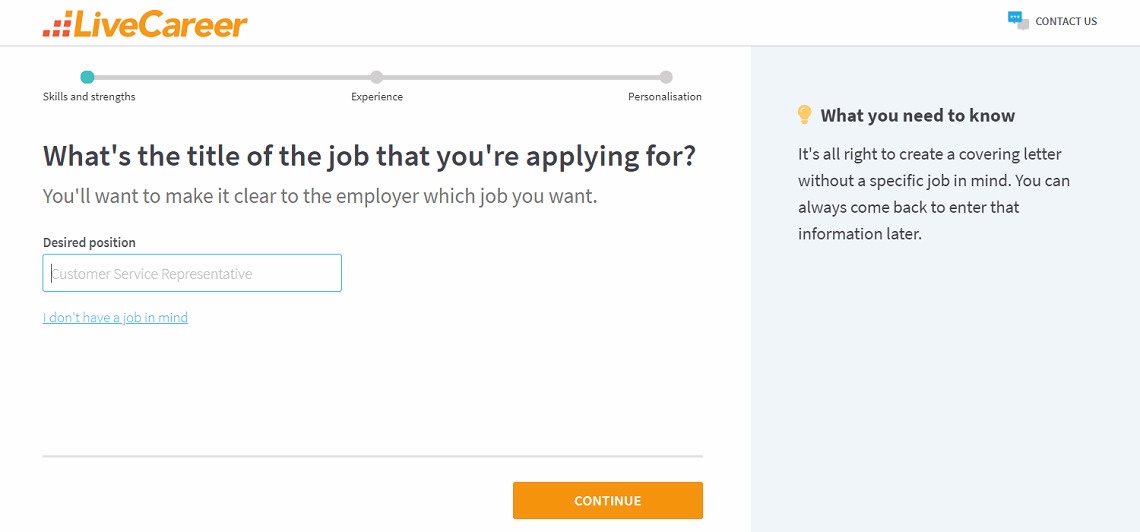
Open your cover letter by stating clearly what position you are applying to and why. Quickly summarise your academic qualifications and show that you know exactly why you’re applying here and not elsewhere.
Show how your path has naturally led you here, and you will be off to a winning start.
As an MA Philosophy Distinction graduate from UCL with a narrow focus on the Right to Privacy and the way surveillance, crime prevention, and other governmental acts violate it, I am excited to apply to a PhD Philosophy and Public Policy programme at an institution so focused on evaluating global surveillance policy and influencing real, positive change.
Here is the space to elaborate more on your educational background and to set the stage for showing your Master’s education. Show how your findings situate themselves in the body of knowledge on the subject.
Highlight what is original about your thesis or approach and how it expands the body of knowledge on the subject. Mention any other publications that supplement your thesis, even the ones that are planned or due to be published.
I completed my MA writing on the philosophical and moral basis of modern human rights, with a focus on the right to privacy in the digital world to assert whether the Declaration of Human Rights and other conventions could be violated by national internet privacy laws such as the Investigatory Powers Act. During this time, I also worked as a Teaching Assistant, which allowed me constant feedback from the new generation of philosophers on these themes, which helped guide the process when I was selected to assist in interdisciplinary research with Sociology and Psychology colleagues: ‘I Have Nothing To Hide: Understanding and Perceptions of Privacy, Rights to Privacy, and Surveillance in the UK’. Having surveyed a sample of 3,800 subjects, we probed how strong innate feelings of rights are, and how easily apathy towards pursuing one’s rights can be affected by highlighting violations and abuses against the subjects. The results of the study are due to be published in the Journal of British Philosophy.
You don’t have to create any content yourself. The LiveCareer cover letter generator will automatically suggest the best content for your cover letter with ready-made examples and expert tips.
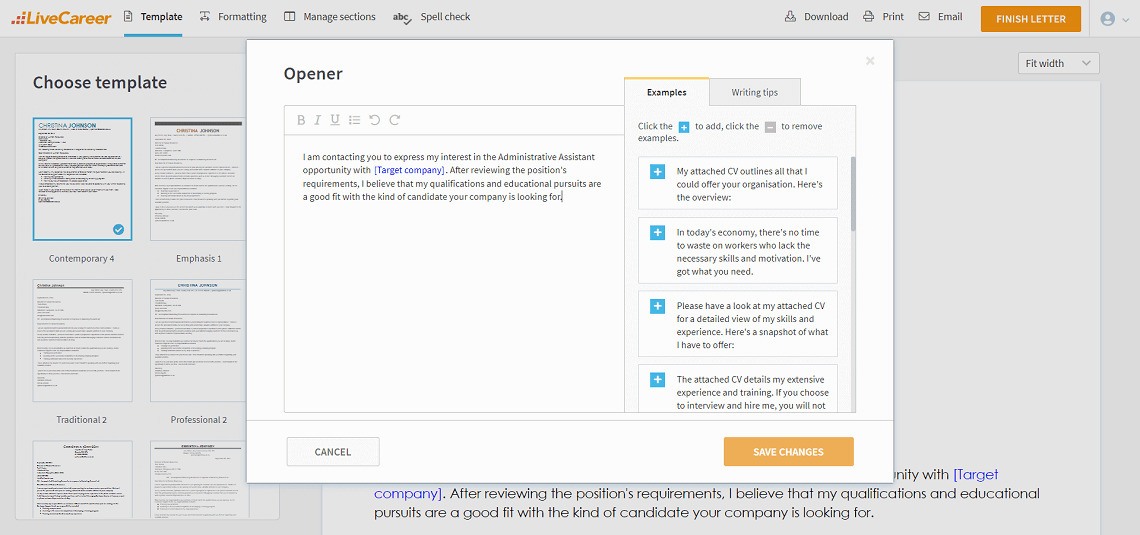
Highlight your specific interests within the course programme and how they relate to you developing your research further. This will show you have done in-depth research into the course programme and chosen wisely.
I am especially interested in the Evidence and Policy part of the course, as I am a firm believer that not only do certain regulations violate our human rights, they do not bring about the outcome that is touted as the justification for them. I am conscious of my need to expand my skill set and approach in the light of my ambition to advocate and advise non-governmental and governmental bodies on necessary concessions and compromises.
It’s time to start tying up all the ends. Show how your previous background and research, combined with the teaching you will receive and your own efforts, will bring something new and useful to the discipline.
Balance your track record with your future plans, and be specific about what you expect to get from your research. Make sure it is realistic, as well as interesting.
When dealing with issues of global technology, it seems like the law and public policy are always playing catch-up. However, an approach based on classic philosophical themes seems to suggest that these measures are misguided and harmful to all. During my PhD study, I would like to stop focusing on the past and theory, and further explore the possible practical consequences of a world without privacy which we seem to be sliding towards, drawing on the body of knowledge in behavioural sciences My previous publications spanned from the root of the rights discussed, through their applications to modern situations, to analysis of the moral and rational shortcomings and violations. By delving into the exploration of possible behavioural consequences, which will no doubt have deep imprints on the future of mankind, I believe this publication will become a comprehensive treatise on the subject.
If you have specific professional plans, highlight them and mention how your PhD will allow you to pursue them. Once again, be realistic but bold.
Once you are done rounding out your professional aspirations, close your cover letter out with a call to action—a request for some attention to your previous work and perhaps a more in-depth discussion of how you imagine it.
In the future, I hope there will be a government interested in listening to these concerns, but until then, there are several non-governmental organisations working to make a change, as well as some legal challenges that could use the assistance of an extensive authority on the subject. By allowing me to study the possible future consequences of this line of public policy, we will be able to better influence the imagination of future decision-makers, as well as all citizens.
I invite you to find the publications listed in my CV and see the strong base, committed continuity, and passion I devoted to the subject so far. I would love to discuss any finer or broad points with you.
Best Regards,
Mohammed Whittaker
A PhD cover letter is one of the documents you'll submit as part of a PhD application. Most likely, you want to sound professional and mature. Clear formatting lies at the core of a professionally written document.
Follow these tips for a well-formatted cover letter:
Consult your university resources for the right cover letter length (two-page cover letter is usally not welcome) and type of the cover letter they expect. Sometimes, there is no application letter required.
Your PhD CV and cover letter must have the same style. Though everyone knows a CV is not a cover letter, they are two parts of a single application. You won’t be allowed to continue your research if you can’t continue an application neatly.
Choose the right font size. Pick a readable, but elegant font that matches your CV font—think Arial, Calibri, Noto, or Garamond.
Pick a simple cover letter template without fancy graphics. Use white space between sections and paragraphs to guide the reader’s eyes. Center your PhD cover letter on all sides using even, 1-inch margins. If your university has a word limit for cover letters, and you run out of space, consider pulling out some bullet points.
Tailoring your PhD cover letter is key. There will be only a few places where you can reasonably apply, and you ought to find out as much as you can about all of them before you even start writing the first cover letter for PhD.
A cover letter alone simply won’t be enough—you need an impactful CV, too. Create your CV in minutes. Just follow our wizard and fill in every CV section with ready-made content. Get started by choosing a professional CV template.
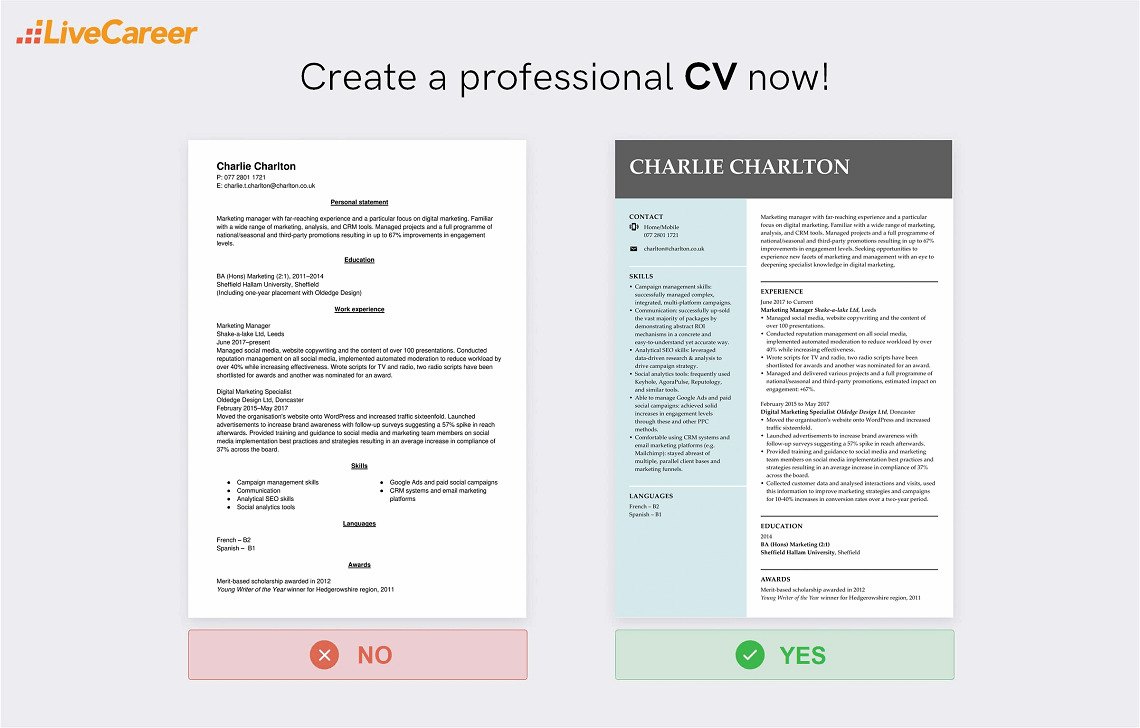
*Data was collected from July 2023 to June 2024.
Our editorial team has reviewed this article for compliance with LiveCareer’s editorial guidelines. It’s to ensure that our expert advice and recommendations are consistent across all our career guides and align with current CV and cover letter writing standards and trends. We’re trusted by over 10 million job seekers, supporting them on their way to finding their dream job. Each article is preceded by research and scrutiny to ensure our content responds to current market trends and demand.
Category: Cover Letter Examples
Crafting a job-winning CV is all about showcasing your unique skills and experiences. Start with a strong personal statement that highlights your career goals and achievements.
Try Our CV Builder Now